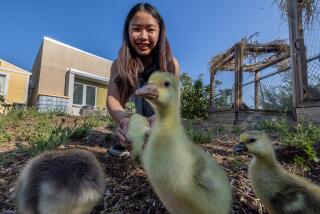The New Reality : Educators are using interactive television to teach environmental science. And they say it works.
- Share via
In Universal City they’re installing electronic “virtual reality” facilities to take kids on a new ride into a completely fake world. But in Oxnard they’re going the other way, with an electronic rig that takes kids deeper into the real world. Blackstock School is now teaching environmental science through interactive television.
“We just started the plant kingdom with the question ‘What plant am I today?’ ” explained seventh-grade science teacher Michelle Laubacher. “Having the multimedia computer screens in front of them is a great motivator. They love it.”
The attraction is role-playing, of course, which appeals to any kid. But the result is that instead of becoming couch potatoes or high-tech junkies, kids in Ventura County schools with interactive TV facilities are becoming environmentalists and getting better science grades.
Joanne Borchard’s eighth-grade science class at Blackstock enters an “Eco-Adventure in the Rain Forest” via a computer program--not unlike a commercial computer game--which puts the student in the role of an ecologist tracking threats to the flora and fauna.
Another interactive program is derived from footage shot by the PBS “Nova” crew. It is woven into a mystery game where the student has to choose which door to go through.
“The student is on the trail of animal poachers, and in the newsreel footage, which comes up on the screen as evidence, they actually get to meet one,” said Borchard. “They’re shocked.”
Lest anyone think that all this screen gazing, computer crunching and sifting through incriminating videotape evidence is going to lead our county to a non-reading, non-writing future--think again.
“These 13-year-olds have to keep a scientific log of their journeys through the rain forests and what they do,” Laubacher said. Because it’s done on computer, they have had to learn to type--as well as how to express themselves in writing.
“Then they press the Print button on the laser printer and hand me their report,” Laubacher said.
Being an eco-Indiana Jones or junior Darwin courtesy of a video terminal and a stack of real-world science data on magnetic discs “has increased kids’ motivation and improved their science grades in standardized tests,” Laubacher said.
She, Borchard and four other teachers from the Hueneme School District will demonstrate their work with interactive video science teaching next month in Palm Springs. They do this a lot. Last year 1,500 educators from all over the world trooped through Blackstock to catch the action. It’s a “model technology school” for the state. Also called a “smart school.”
The decision to use the environment to hook students into studying science is certainly smart. The nation’s largest producer of this kind of electronic science teaching materials, Jostens Learning Corp. of San Diego, sees this as the way of the future.
“It’s not taught as biology or botany, et cetera, anymore,” said John Perry, Jostens’ representative in Ventura County.
“State education administrators like to use the term ‘interdisciplinary science studies,’ but we call it environment,” said Ruth Von Blum, head of the science development department at Jostens. “Either way, the kids learn the same things. They like it better than when it was divided into separate sciences.”
The state of Texas has adopted a science curriculum entirely on interactive videodisc. It comes from Optical Data Corp. in New Jersey.
In school districts such as the one in El Paso, the materials--called “Windows on Science”--have replaced science textbooks. In other districts, textbooks are used as a supplement. Such is the case at our own Westlake High, where Henry Rollins is using “Windows on Science” to allow students to “visit” various coastlines and wetlands around the country and compile scientific reports.
Another course, produced by the National Geographic Society for younger kids, but not yet in use locally, has the provocative title “Planetary Manager--Kids Learn to Manage the Environment.”
The staff of the Ventura County schools superintendent is looking into the new video interactive teaching materials. One big attraction is the stereo soundtracks--not left ear/right ear, but Spanish on one track and English on the other. Just flip a switch.
For Californians, this is the stuff of real reality, not “virtual” reality.
* FYI
The trade organization Computer Using Educators Inc. in Santa Clara provides information on interactive video science teaching and they are the organizers of an annual trade show, which will be held May 7 and 8 in Palm Springs. For more information, call (408) 496-2935.






